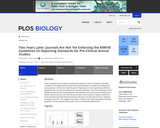
This resource is a video abstract of a research paper created by Research Square on behalf of its authors. It provides a synopsis that's easy to understand, and can be used to introduce the topics it covers to students, researchers, and the general public. The video's transcript is also provided in full, with a portion provided below for preview:
"Succinate is a metabolite and extracellular signal transductor with complex, but largely inflammatory, roles in the human body. Circulating succinate is elevated in patients with obesity and type 2 diabetes and has been linked to numerous complications. Both human cells and gut bacteria generate succinate, but how microbial succinate production impacts circulating levels and host health remains unclear. In a recent study, combined evidence from human patients and mice point to intestinal succinate as a key factor in obesity-related metabolic disturbances. Specifically, gut microbiota is identified as a relevant source of the high levels of circulating succinate found in obesity. However, modulation of intestinal flora dysbiosis of obese mice with succinate-consuming bacteria as a probiotic might reduce circulating succinate levels. Odoribacter laneus was a particularly promising candidate for this purpose. O..."
The rest of the transcript, along with a link to the research itself, is available on the resource itself.
- Subject:
- Biology
- Life Science
- Material Type:
- Diagram/Illustration
- Reading
- Provider:
- Research Square
- Provider Set:
- Video Bytes
- Date Added:
- 04/14/2023
